
In a landmark initiative to protect coral reefs and nurture environmental stewardship, the Perry Institute for Marine Science (PIMS), in collaboration with the Bahamian government is spearheading a program to provide key government officials with scuba training.
The initiative aims to elevate the conservation skills and awareness of young professionals in government regulatory departments. These individuals, integral to ministries dedicated to marine research and conservation, are regarded as key to the country’s environmental future.
Dr. Craig Dahlgren, executive director of PIMS, said: “We see so much potential in these individuals. Armed with the right tools and training, they can lead transformative efforts to protect Bahamian marine environments for future generations. This partnership is an embodiment of that shared vision.”

Voices from the Dive: Testimonials from Newly Certified Officers
PIMS has championed ocean health and longevity for over five decades. Its unparallelled experience in preserving coral reefs, coastal habitats like mangrove ecosystems, and critical fisheries, especially in The Bahamas and the Caribbean, positions PIMS as the ideal partner in this collaboration.
So far, the Perry Institute’s dive teams have conducted a PADI Open Water SCUBA certification program for nine government employees. This comprehensive training program, conducted over five days, blends theory with practice.
Herbert Pinder, Assistant Environmental Officer at The Department of Environmental Planning & Protection (DEPP), said: “The experience and thrill that a person has when diving is completely different. It opens our eyes to what the marine environment conditions are currently and how we can conduct developments in an environmentally sound manner.”
Quetta Gibson, DEPP’s Assistant Environmental Officer, said: “The underwater experience is like none I’ve ever encountered. You are able to view the peace and tranquility of the marine world. You are able to participate in underwater activities that impact or potentially impact the environment and provide feedback.”
Akehia Thompson, Assistant Fisheries Superintendent at the Department of Marine Resources (DMR), said: “Taking my first giant stride off the side of the boat, I knew I was right where I belonged. Diving into a whole new world, where theory comes to life, this course has not only been enjoyable but enlightening, and l look forward to utilizing all the skills I’ve gained during this course for the betterment of my unit.”


Putting Those Skills to Use
The timing of this collaboration is significant, as Bahamian reef systems are currently facing unprecedented urgent and serious threats. Recent spikes in ocean temperatures have wreaked havoc on coral reefs in The Bahamas, triggering extensive coral bleaching and threatening to erase the marine beauty integral to the region. Adding to this catastrophe is the onslaught of the Stony Coral Tissue Loss Disease (SCTLD) pandemic. Without drastic action, these twin dangers will have long-lasting repercussions on the Bahamian way of life – which is inextricably connected to the sea.
To help mitigate the effects of SCTLD, a new coral nursery was established in May offshore of Lighthouse Point, Eleuthera, thanks to a dynamic collaboration between Disney Cruise Line, PIMS, and the Cape Eleuthera Institute. This nursery is dedicated to cultivating critically endangered staghorn and elkhorn corals, with scientists meticulously selecting the most resilient specimens to withstand coral bleaching. These robust corals are then relocated to struggling reefs in the area. Disney has worked since 2007 to rehabilitate coral reefs in The Bahamas, including donating millions of dollars from the Disney Conservation Fund to important conservation projects.
In June, two DEPP officers visited the coral nursery managed by PIMS at Disney Lookout Cay at Lighthouse Point to place new coral onto fish habitats that Disney installed beside the island destination’s trestle pier. These unique fish habitats use native limestone from the island to conserve local marine environments. PIMS and Disney are proud to share their work with the young professionals at DEPP who are committed to preserving these vital marine habitats. Notably, one of the officers earned her SCUBA certification during this trip.
Research and Regulation for the Blue Economy
Coral reefs in the US contribute a remarkable $3.4 billion to the economy each year. On a global scale, that figure skyrockets to an astounding $2.7 trillion. Bahamian reefs, with a potential value of $135 million per square kilometer, stand not only as ecological wonders but also as significant economic pillars. These reefs play a vital role in serving as natural barriers against severe weather, supporting the seafood industry, and providing a sanctuary for diverse marine life, thus ensuring the livelihood of local communities, creating jobs, and safeguarding coastlines. Undoubtedly, the imperative to protect and sustain them is paramount.
Through the collaborative efforts of PIMS, Disney Cruise Line, and local regulatory bodies, The Bahamas is raising awareness on the importance of protecting these reefs and responding to the coral crisis with vigor. As a collaboration between regulators, researchers, and conservationists, this new alliance hopes to steer The Bahamas towards a future where marine conservation isn’t just a goal but an intrinsic part of the nation’s ethos.
This capacity building effort is a cornerstone of PIMS’ strategy to preserve the natural beauty of The Bahamas, made possible through the unwavering support of Disney. Bradley Watson, Conservation Program Manager at Disney, said: “Seeing those nine newly certified SCUBA divers was a dream come true for us at Disney. We believe in the Bahamian Blue Economy and we know that the public sector needs skilled officers to protect the ecosystems that economy is built on. Every time a new student, public servant, or nature lover puts on their gear and takes their first big step off the back of a boat, our marine resources get a little safer and our future gets a little brighter.”

About the Perry Institute for Marine Science (PIMS)
For over 50 years, the Perry Institute for Marine Science (PIMS) has been at the forefront of marine research and conservation in The Bahamas and the Caribbean. Our mission is clear: leading through science, we innovate solutions, create opportunities, and inspire action to protect and restore ocean life for people and the planet. Our vision? Thriving seas and empowered communities.
From our beginnings as the most productive marine lab and field station in the world on Lee Stocking Island, we’ve evolved into a global, program-based non-profit tackling critical issues such as coral reef restoration, fisheries conservation, and the protection of mangrove and coastal ecosystems. Our holistic approach integrates cutting-edge scientific research with community education and engagement, as well as international collaboration to make lasting impacts on marine environments.
At PIMS, we’re more than just scientists—we’re educators, advocates, and partners. We empower local communities, provide pathways to conservation careers, and work tirelessly to protect and restore the ocean ecosystems that are vital to both biodiversity and human well-being.
For more information on the Rising Tides Youth Program and other initiatives, please visit the Perry Institute’s website or follow them on social media.
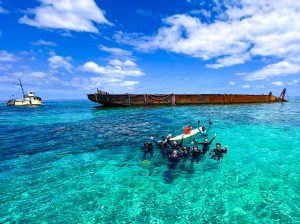
PIMS and Volunteers Step Up as Legal Battle Leaves Barge Grinding Reef in Fowl Cays National Park
Worn out but undefeated, the cleanup crew rallies around their paddleboard “workbench” in front of the stranded tug and barge—a snapshot of community grit after hours of underwater heavy‑lifting. Photo
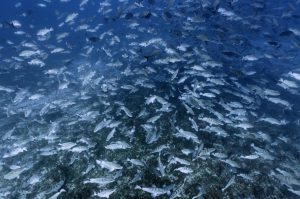
Thriving Fish Spawning Aggregation Inspires Hope for the Future
Nassau grouper FSA in Ragged Island during January 2025. | © André Musgrove Fish Spawning Aggregations & Nassau Grouper Imagine witnessing thousands of fish gathering in a synchronized spectacle, moving
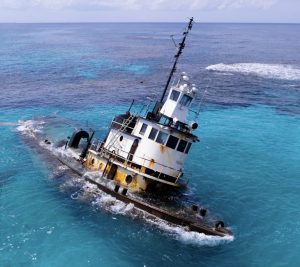
A Year Later, Stranded Tug and Barge Still Scars Reef in Fowl Cays National Park–Residents Demand Accountability
A haunting aerial view of the grounded tug and barge in Fowl Cays National Park—still embedded in coral a year later, a stark reminder of the cost of inaction. Photo
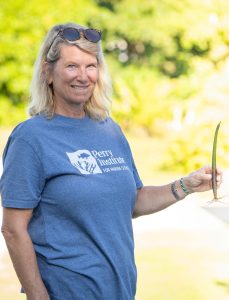
Women Leading Mangrove Restoration in The Bahamas
Have you ever wondered who’s behind the scenes saving our environment, right in our own backyard? Picture a group of energetic, determined women rolling up their sleeves and diving into
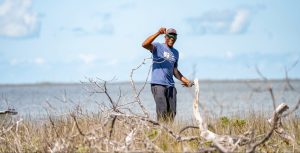
Rewilding the Marls of Abaco: PIMS Plants 100,000 Mangroves and Counting in 2024
As the afternoon sun bathes the Marls of Abaco in golden light, Bahamian boat captain Willis Levarity–locally known as “Captain to the Stars”–stands ankle-deep in soft, warm mud. A broad
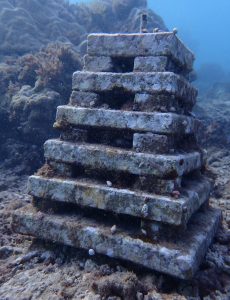
Unveiling Coral Reef Biodiversity: Insights from ARMS Monitoring Structures
An ARM teeming with new coral recruits and a diversity of marine life, highlighting reef recovery and biodiversity Understanding Coral Reef Biodiversity Most new PhDs in the natural sciences move





